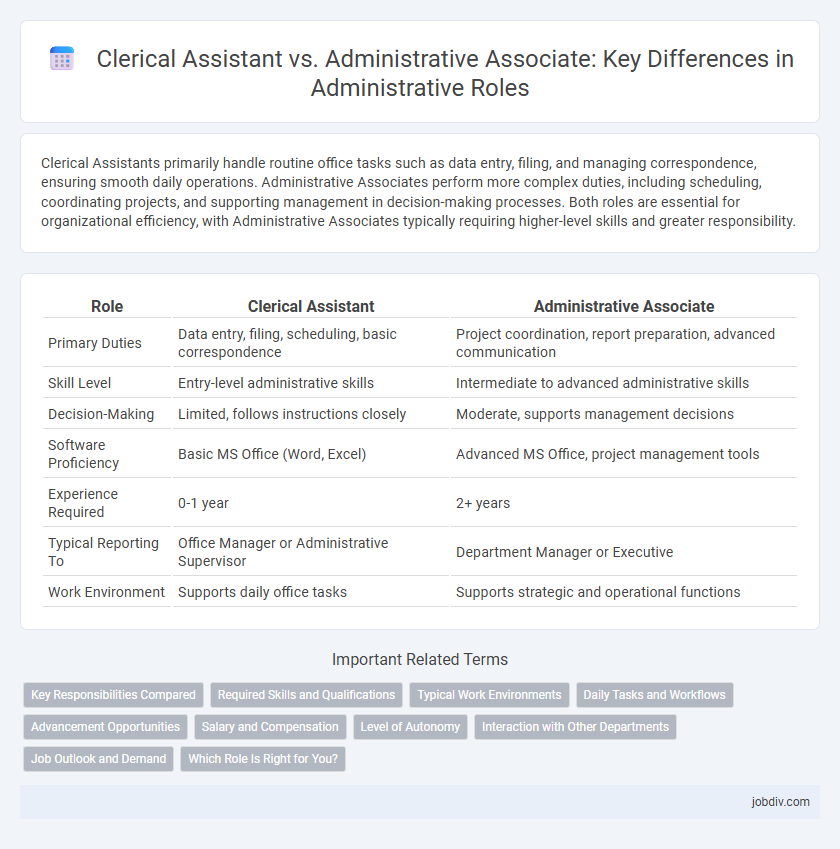Clerical Assistants primarily handle routine office tasks such as data entry, filing, and managing correspondence, ensuring smooth daily operations. Administrative Associates perform more complex duties, including scheduling, coordinating projects, and supporting management in decision-making processes. Both roles are essential for organizational efficiency, with Administrative Associates typically requiring higher-level skills and greater responsibility.
Table of Comparison
| Role | Clerical Assistant | Administrative Associate |
|---|---|---|
| Primary Duties | Data entry, filing, scheduling, basic correspondence | Project coordination, report preparation, advanced communication |
| Skill Level | Entry-level administrative skills | Intermediate to advanced administrative skills |
| Decision-Making | Limited, follows instructions closely | Moderate, supports management decisions |
| Software Proficiency | Basic MS Office (Word, Excel) | Advanced MS Office, project management tools |
| Experience Required | 0-1 year | 2+ years |
| Typical Reporting To | Office Manager or Administrative Supervisor | Department Manager or Executive |
| Work Environment | Supports daily office tasks | Supports strategic and operational functions |
Key Responsibilities Compared
Clerical Assistants primarily handle routine tasks such as data entry, filing, and managing correspondence to ensure smooth office operations. Administrative Associates take on broader responsibilities including scheduling meetings, preparing reports, and coordinating between departments to support managerial functions. Both roles require strong organizational skills, but Administrative Associates typically engage in more complex administrative duties that contribute to strategic office management.
Required Skills and Qualifications
Clerical Assistants typically require strong organizational skills, proficiency in data entry, basic computer literacy, and familiarity with office software like Microsoft Office Suite. Administrative Associates demand advanced competencies such as project management, effective communication, multitasking abilities, and experience with office equipment and software integration. Both roles value attention to detail and time management, but Administrative Associates often need higher education or specialized training compared to Clerical Assistants.
Typical Work Environments
Clerical Assistants typically work in office settings such as schools, hospitals, and government agencies, where they handle routine administrative tasks like filing, data entry, and answering phones. Administrative Associates often operate in corporate offices, legal firms, or nonprofit organizations, performing more complex duties including scheduling, report preparation, and coordinating communications. Both roles require proficiency in office software and effective interpersonal skills to support daily operations efficiently.
Daily Tasks and Workflows
Clerical Assistants primarily handle routine tasks such as data entry, filing, answering phones, and managing correspondence, ensuring smooth daily office operations. Administrative Associates perform more complex duties including coordinating schedules, preparing reports, handling communications, and supporting project management workflows. Both roles require strong organizational skills but differ in scope, with Administrative Associates typically involved in higher-level administrative functions and decision-making support.
Advancement Opportunities
Clerical Assistants typically have limited advancement opportunities, primarily progressing to Administrative Assistants or specialized clerical roles within their department. Administrative Associates often experience broader career growth, moving into office management, project coordination, or executive support positions due to their expanded responsibilities and skill set. Organizations value Administrative Associates for their ability to handle complex tasks, making them prime candidates for leadership roles and professional development programs.
Salary and Compensation
Clerical Assistants typically earn an average salary of $30,000 to $40,000 annually, reflecting entry-level administrative support roles with basic duties. Administrative Associates command higher compensation, ranging from $40,000 to $55,000 per year, due to increased responsibilities and specialized skills in office management and coordination. Salary variance is influenced by factors such as industry, location, and company size, with Administrative Associates often receiving additional benefits or bonuses linked to performance.
Level of Autonomy
Clerical Assistants typically operate under close supervision, handling routine tasks such as data entry, filing, and scheduling with limited decision-making authority. Administrative Associates exercise a higher level of autonomy, managing complex tasks including project coordination, report preparation, and direct communication with stakeholders. The level of autonomy reflects the scope of responsibility, with Administrative Associates expected to prioritize tasks and solve problems independently.
Interaction with Other Departments
Clerical Assistants primarily handle routine tasks such as filing, data entry, and answering phones, supporting internal departments by maintaining smooth workflow and accurate records. Administrative Associates engage in more complex coordination, collaborating closely with multiple departments to facilitate project management, scheduling, and communication. Their enhanced interaction capabilities enable effective cross-departmental support, improving overall organizational efficiency.
Job Outlook and Demand
The job outlook for Clerical Assistants is projected to decline due to increased automation and digitalization of administrative tasks, leading to reduced demand in traditional clerical roles. In contrast, Administrative Associates are expected to see stable or growing demand as their responsibilities often encompass more complex organizational and communication duties that require human judgment and versatility. Employers prioritize candidates with advanced computer skills and multitasking abilities, driving greater opportunities for Administrative Associates in evolving office environments.
Which Role Is Right for You?
A Clerical Assistant primarily handles data entry, filing, and basic office tasks, ideal for individuals seeking structured, routine work in a supportive role. An Administrative Associate takes on broader responsibilities including scheduling, project coordination, and internal communication, suited for those seeking a dynamic position with greater decision-making opportunities. Choosing the right role depends on your preference for either consistent operational duties or more diverse administrative challenges.
Clerical Assistant vs Administrative Associate Infographic

 jobdiv.com
jobdiv.com